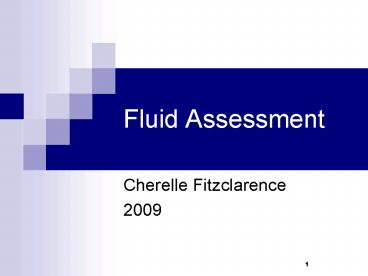Fluid Assessment - PowerPoint PPT Presentation
1 / 21
Title:
Fluid Assessment
Description:
Kidneys Gut Lungs Skin. Extracellular fluid - 12 litres. PG. REGULATION OF FLUID VOLUME ... ECF and ICF fluid shifts occur related to changes in pressure within ... – PowerPoint PPT presentation
Number of Views:76
Avg rating:3.0/5.0
Title: Fluid Assessment
1
Fluid Assessment
- Cherelle Fitzclarence
- 2009
1
2
Overview
- Revision
- Cases
3
We are approximately two-thirds water
4
(No Transcript)
5
(No Transcript)
6
(No Transcript)
7
Fluid shifts / intakes
Kidneys Gut Lungs Skin
Intracellular 30 litres
Interstitial9 litres
IV 3 litres
Extracellular fluid - 12 litres
8
Fluid shifts / intakes
Kidneys Gut Lungs Skin
Intracellular 30 litres
Interstitial9 litres
IV 3 litres
Extracellular fluid - 12 litres
9
REGULATION OF FLUID VOLUME
10
BODY FLUID COMPARTMENTS
- RULE OF THIRDS
- Intracellular 2/3 (40 TBW)
- Extracellular 1/3 (20 TBW)
- Interstitial Lymph 2/3 (15 TBW)
- Intravascular 1/3 (5 TBW)
11
Fluid Pressures (Starlings Law)
- ECF and ICF fluid shifts occur related to changes
in pressure within the compartments - Fluid flows only when there is a difference in
pressure - 3 types of body fluids
- Isotonic
- Hypotonic
- Hypertonic
12
Fluid shifting
- 1st space shifting- normal distribution of fluid
in both the ECF compartment and ICF compartment. - 2nd space shifting- excess accumulation of
interstitial fluid (edema) - 3rd space shifting- fluid accumulation in areas
that are normally have no or little amounts of
fluids (ascites)
13
FLUID VOLUME DEFICIT
- Hypovolemia isotonic extracellular fluid
deficit - Deficiency of both water electrolytes
- Caused by decreased intake, vomiting, diarrhea,
fluid shift
- Dehydration hypertonic extracellular fluid
deficit - Deficiency of water
- Caused by water loss related to high blood
glucose, inadequate ADH production, high fever,
excess sweating
14
Assessment of Fluid Deficit
- Hypotension
- Weak rapid pulse
- Temperature decreased if hypovolemic, and
increased in dehydration - Weight loss
- Skin turgor poor in dehydration and possible
edema in hypovolemic - Concentrated urine and blood
15
FLUID VOLUME EXCESS
- Extracellular isotonic fluid excess
- Excess of both water and electrolytes
- Caused by retention of water and electrolytes
related to kidney disease overload with isotonic
IV fluids
- Intracellular water excess
- Excess of body water without excess electrolytes
- Caused by over-hydration in the presence of renal
failure administration of D5W
16
FLUID VOLUME EXCESS/Assessment
- Isotonic
- Hypertension
- Bounding pulse
- Crackles, dyspnea
- Weight gain
- Edema in extremities
- JVD
- Irritable, confused
- Hypotonic
- Systolic B/P
- Decreased pulse
- Increased respirations
- Weight gain
- Cerebral edema
- Irritable, confused
17
FLUID VOLUME EXCESS/ Treatment
- Isotonic
- Correct cause
- Restrict H2O and Na
- Diuretics
- Digitalis
- Possible dialysis
- Hypotonic
- Correct cause
- Restrict H2O intake
- IV fluids with E-lytes
18
(No Transcript)
19
(No Transcript)
20
(No Transcript)
21
Dehydration
- Occurs when fluid loss exceeds intake
- sweating vs time
- Fluid lost mostly from ECF
- decreased circulating blood volume
inadequate tissue perfusion, inefficient
transport of substrates to muscle, and elevated HR

